 Technology peripherals
Technology peripherals AI
AI AI experts warn, but which one is more worth worrying about, the immediate problem or the risk of destroying humanity?
AI experts warn, but which one is more worth worrying about, the immediate problem or the risk of destroying humanity?
News on May 4th, the “big guys” who built today’s basic artificial intelligence technology have issued warnings, saying that this technology is potentially dangerous. However, they currently have no consensus on the dangers of AI or the precautions to be taken.
Geoffrey Hinton, known as the "Godfather of Artificial Intelligence," has just announced his resignation from Google. He regrets some of his work because he fears machines will become smarter than humans, jeopardizing humanity's survival.
Yoshua Bengio, a professor at the University of Montreal, is another pioneer in the field of artificial intelligence. He, along with Hinton and Yann LeCun, Meta's chief artificial intelligence scientist, received the 2018 Turing Award for breakthroughs in artificial neural networks that are critical to the development of today's artificial intelligence applications such as ChatGPT. On Wednesday, Bengio said he "strongly agrees" with Hinton's concerns about chatbots such as ChatGPT and its related technologies, but he worries that simply saying "we are doomed" won't solve the problem.
Bengio added: "The main difference is that he (Hinton) is a pessimist and I am more optimistic. I do think these dangers are very serious, both short-term and long-term. , not only needs to be taken seriously by a small number of researchers, but also needs to be taken seriously by the government and the people."
There are many signs that governments are listening to the voices of all parties. The White House has summoned the CEOs of Google, Microsoft and ChatGPT maker OpenAI for a "candid" discussion with US Vice President Kamala Harris on Thursday focused on how to mitigate their technology short-term and long-term risks. European lawmakers are also accelerating negotiations to pass comprehensive AI regulatory rules.
And some people worry that over-hyping super-intelligent machines that do not yet exist and fantasizing about the most terrifying dangers they can cause will distract people from developing practical safeguards for current artificial intelligence products, and these Products are often not regulated.
For Margaret Mitchell, the former head of Google’s AI ethics team, she was disturbed that Hinton was not outspoken during his decade at the helm of Google, especially This comes after prominent black scientist Timnit Gebru was fired in 2020. Gebru studied the dangers of large language models before they were widely commercialized into products like ChatGPT and Google Bard.
After Gebru left, Mitchell was also forced to leave Google. She said: "She (Gebru) is fortunate to be outside the circle of discriminatory communication, hateful language, derogation of women and non-consensual pornography, all of which are harmful to marginalized people in the technology field. People. She skipped all those things and could worry about more distant things."
Of the three winners of the 2018 Turing Award, Bengio is the only one who doesn't work at a big tech company people. For years, he has expressed concerns about the near-term risks of artificial intelligence, including job market instability, the dangers of autonomous weapons and biased data sets, among others.
But recently, those concerns have become more serious, prompting Bengio to join forces with Tesla CEO Elon Musk and Apple co-founder Steve Wozniak Other computer scientists and tech business leaders, including Steve Wozniak, have called for a six-month moratorium on development of artificial intelligence systems more powerful than OpenAI's latest model, GPT-4.
Bengio said on Wednesday that he believed the latest artificial intelligence language models had passed the "Turing test." The Turing Test, named after a method developed in 1950 by British codebreaker and AI pioneer Alan Turing, is designed to measure when artificial intelligence becomes indistinguishable from humans, at least on the surface.
Bengio said: "This is a milestone, but if we are not careful, it could have serious consequences. My main concern is how these technologies will be exploited to launch cyber attacks and spread disinformation and other evil Purpose. You can talk to these systems and think you're interacting with a real person. They're hard to tell."
Researchers dispute whether current artificial intelligence language systems can be smarter than humans because these systems There are many limitations, such as a tendency to fabricate information.
Aidan Gomez was one of the co-authors of a seminal 2017 paper that introduced a so-called converter technique for improving the performance of machine learning systems, specifically Learning from text passages. Gomez, then just 20 years old, was an intern at Google. He remembers lying on a couch at the company's California headquarters around 3 a.m. when his team sent the paper.
Gomez remembers a colleague telling him, “This is going to have a huge impact.” Their research has since helped spur the emergence of new systems that can generate articles that resemble human-written articles.
Six years later, Gomez is now the CEO of Cohere, the artificial intelligence company he founded. He was enthusiastic about the potential applications of these systems, but he was also troubled by the threats to the technology. He said the true capabilities of these systems are disconnected from reality and rely on extraordinary powers of imagination and reasoning.
The idea that these models will somehow gain control of nuclear weapons and launch some kind of extinction-level event is unfounded and unhelpful to truly pragmatic policy efforts that are trying to do good, Gomez said. .”
The above is the detailed content of AI experts warn, but which one is more worth worrying about, the immediate problem or the risk of destroying humanity?. For more information, please follow other related articles on the PHP Chinese website!
 2023年机器学习的十大概念和技术Apr 04, 2023 pm 12:30 PM
2023年机器学习的十大概念和技术Apr 04, 2023 pm 12:30 PM机器学习是一个不断发展的学科,一直在创造新的想法和技术。本文罗列了2023年机器学习的十大概念和技术。 本文罗列了2023年机器学习的十大概念和技术。2023年机器学习的十大概念和技术是一个教计算机从数据中学习的过程,无需明确的编程。机器学习是一个不断发展的学科,一直在创造新的想法和技术。为了保持领先,数据科学家应该关注其中一些网站,以跟上最新的发展。这将有助于了解机器学习中的技术如何在实践中使用,并为自己的业务或工作领域中的可能应用提供想法。2023年机器学习的十大概念和技术:1. 深度神经网
 人工智能自动获取知识和技能,实现自我完善的过程是什么Aug 24, 2022 am 11:57 AM
人工智能自动获取知识和技能,实现自我完善的过程是什么Aug 24, 2022 am 11:57 AM实现自我完善的过程是“机器学习”。机器学习是人工智能核心,是使计算机具有智能的根本途径;它使计算机能模拟人的学习行为,自动地通过学习来获取知识和技能,不断改善性能,实现自我完善。机器学习主要研究三方面问题:1、学习机理,人类获取知识、技能和抽象概念的天赋能力;2、学习方法,对生物学习机理进行简化的基础上,用计算的方法进行再现;3、学习系统,能够在一定程度上实现机器学习的系统。
 超参数优化比较之网格搜索、随机搜索和贝叶斯优化Apr 04, 2023 pm 12:05 PM
超参数优化比较之网格搜索、随机搜索和贝叶斯优化Apr 04, 2023 pm 12:05 PM本文将详细介绍用来提高机器学习效果的最常见的超参数优化方法。 译者 | 朱先忠审校 | 孙淑娟简介通常,在尝试改进机器学习模型时,人们首先想到的解决方案是添加更多的训练数据。额外的数据通常是有帮助(在某些情况下除外)的,但生成高质量的数据可能非常昂贵。通过使用现有数据获得最佳模型性能,超参数优化可以节省我们的时间和资源。顾名思义,超参数优化是为机器学习模型确定最佳超参数组合以满足优化函数(即,给定研究中的数据集,最大化模型的性能)的过程。换句话说,每个模型都会提供多个有关选项的调整“按钮
 得益于OpenAI技术,微软必应的搜索流量超过谷歌Mar 31, 2023 pm 10:38 PM
得益于OpenAI技术,微软必应的搜索流量超过谷歌Mar 31, 2023 pm 10:38 PM截至3月20日的数据显示,自微软2月7日推出其人工智能版本以来,必应搜索引擎的页面访问量增加了15.8%,而Alphabet旗下的谷歌搜索引擎则下降了近1%。 3月23日消息,外媒报道称,分析公司Similarweb的数据显示,在整合了OpenAI的技术后,微软旗下的必应在页面访问量方面实现了更多的增长。截至3月20日的数据显示,自微软2月7日推出其人工智能版本以来,必应搜索引擎的页面访问量增加了15.8%,而Alphabet旗下的谷歌搜索引擎则下降了近1%。这些数据是微软在与谷歌争夺生
 荣耀的人工智能助手叫什么名字Sep 06, 2022 pm 03:31 PM
荣耀的人工智能助手叫什么名字Sep 06, 2022 pm 03:31 PM荣耀的人工智能助手叫“YOYO”,也即悠悠;YOYO除了能够实现语音操控等基本功能之外,还拥有智慧视觉、智慧识屏、情景智能、智慧搜索等功能,可以在系统设置页面中的智慧助手里进行相关的设置。
 30行Python代码就可以调用ChatGPT API总结论文的主要内容Apr 04, 2023 pm 12:05 PM
30行Python代码就可以调用ChatGPT API总结论文的主要内容Apr 04, 2023 pm 12:05 PM阅读论文可以说是我们的日常工作之一,论文的数量太多,我们如何快速阅读归纳呢?自从ChatGPT出现以后,有很多阅读论文的服务可以使用。其实使用ChatGPT API非常简单,我们只用30行python代码就可以在本地搭建一个自己的应用。 阅读论文可以说是我们的日常工作之一,论文的数量太多,我们如何快速阅读归纳呢?自从ChatGPT出现以后,有很多阅读论文的服务可以使用。其实使用ChatGPT API非常简单,我们只用30行python代码就可以在本地搭建一个自己的应用。使用 Python 和 C
 人工智能在教育领域的应用主要有哪些Dec 14, 2020 pm 05:08 PM
人工智能在教育领域的应用主要有哪些Dec 14, 2020 pm 05:08 PM人工智能在教育领域的应用主要有个性化学习、虚拟导师、教育机器人和场景式教育。人工智能在教育领域的应用目前还处于早期探索阶段,但是潜力却是巨大的。
 人工智能在生活中的应用有哪些Jul 20, 2022 pm 04:47 PM
人工智能在生活中的应用有哪些Jul 20, 2022 pm 04:47 PM人工智能在生活中的应用有:1、虚拟个人助理,使用者可通过声控、文字输入的方式,来完成一些日常生活的小事;2、语音评测,利用云计算技术,将自动口语评测服务放在云端,并开放API接口供客户远程使用;3、无人汽车,主要依靠车内的以计算机系统为主的智能驾驶仪来实现无人驾驶的目标;4、天气预测,通过手机GPRS系统,定位到用户所处的位置,在利用算法,对覆盖全国的雷达图进行数据分析并预测。


Hot AI Tools

Undresser.AI Undress
AI-powered app for creating realistic nude photos

AI Clothes Remover
Online AI tool for removing clothes from photos.

Undress AI Tool
Undress images for free

Clothoff.io
AI clothes remover

AI Hentai Generator
Generate AI Hentai for free.

Hot Article

Hot Tools

SublimeText3 English version
Recommended: Win version, supports code prompts!

mPDF
mPDF is a PHP library that can generate PDF files from UTF-8 encoded HTML. The original author, Ian Back, wrote mPDF to output PDF files "on the fly" from his website and handle different languages. It is slower than original scripts like HTML2FPDF and produces larger files when using Unicode fonts, but supports CSS styles etc. and has a lot of enhancements. Supports almost all languages, including RTL (Arabic and Hebrew) and CJK (Chinese, Japanese and Korean). Supports nested block-level elements (such as P, DIV),

Zend Studio 13.0.1
Powerful PHP integrated development environment

Atom editor mac version download
The most popular open source editor

MinGW - Minimalist GNU for Windows
This project is in the process of being migrated to osdn.net/projects/mingw, you can continue to follow us there. MinGW: A native Windows port of the GNU Compiler Collection (GCC), freely distributable import libraries and header files for building native Windows applications; includes extensions to the MSVC runtime to support C99 functionality. All MinGW software can run on 64-bit Windows platforms.





